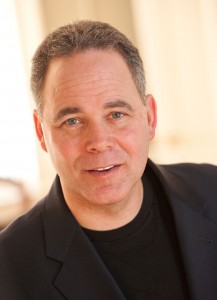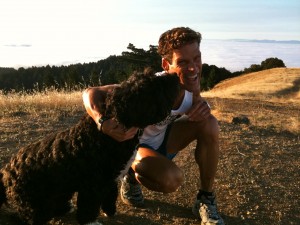I recently finished two books about runners that I recommend for anyone—especially any guy—on your gift list. They’re not only about running and for runners. Midlife career shifts, friendships and father-son relationships run through In the Long Run: A Father, a Son, and Unintentional Lessons in Happinessby Jim Axelrod and Run!: 26.2 Stories of Blisters and Bliss
by Dean Karnazes. Both authors play with the metaphor and narrative arc of a marathon, and they share a gift for storytelling and self-deprecating humor that keep their stories from hitting any wall.
I picked up these books and met the authors at a book-signing event earlier this year. The men provide an interesting study in contrasts as runners—a beginner (Axelrod) and an uber-ultramarathoner (Karnazes)—and as media professionals as well. Axelrod is the consummate heavy-hitting, old-school journalist, since he served as chief White House correspondent for CBS News and survived a close call while reporting from Iraq. Karnazes uses the media to broadcast his inspirational messages and to make a living through sponsorships. As a celebrity athlete invited on morning TV and late-night talk shows, Karnazes is the object of the kind of infotainment that Axelrod might be wary of.
Given their time spent in front of a camera, I expected these two men to have outsized egos, but instead each was so deferential to the other—Axelrod in awe of Karnazes’ fitness, Karanzes exuding respect for Axelrod as a writer and reporter—that their joint appearance made them appear humbled. Axelrod introduced Karnazes to his family as the guy who ran across the country, a reference to Karanzes’ “Run Across America” project last spring, during which he averaged 40 to 50 miles daily while going from Los Angeles to New York. While Axelrod and his family murmured, “Crazy! Wow!” Karnazes said, “The big difference between Jim and me is he can write.”
In the Long Run
In the Long Run opens in the spring of 2008, when Axelrod is in the throes of covering the presidential primary campaign for CBS News. He feels constant pressure to be “on” while chasing the news, coupled with the threat he may be squeezed out of the nightly news lineup in favor of other correspondents. At age 45, he experiences fear and self-loathing when he can’t fit into his favorite suit because he’s at least 30 pounds overweight. “I was eating every kind of sausage biscuit and dollar-menu cheeseburger that awaited me at the bottom of every exit ramp,” he writes. “My body was in the same lousy shape as my career.”
He was covering an Obama rally when out of the blue he got a message on his Blackberry from an old friend who stumbled upon Alexrod’s deceased father’s New York City Marathon times from the early 1980s. Axelrod’s dad ran a 3:29 marathon when he was 46. The news stirs up all kinds of feelings related to Axelrod’s complicated relationship with his father. Somewhat delusional, Axelrod thinks he, too, can run a sub-3:30 marathon the following year, when he turns 46.
Axelrod then heads down a path toward becoming a runner—and, in the process, sorts out the ambivalence he feels toward his career and his father. At the book signing, he said that on the chaotic campaign trail—when he saw his family only 17 days out of four months—he realized, “There was a gap between the life I intended to live and the life I was living, and within the gap contained the potential for great unhappiness. How was I going to shrink that gap? For me, it was running.”
Axelrod suffers injury-induced setbacks and constant career pressure as he tries to stick to a running routine, and he builds up the story of building up his mileage with such drama and humor that I genuinely felt his triumph the first time he ran 10 miles—and also his disappointment when he subsequently measured the route with his odometer and realized he came up short. The incident marks a milestone in the development a real runner: obsessive-compulsive concern for accuracy when measuring time and distance.
Axelrod’s most significant and liberating breakthrough in training comes when he realizes what every runner learns at some point: You have to run your own race. Your best and toughest competitor is yourself. He realizes he unnecessarily has been in competition with his dad his whole life, and he was crazy to think he could beat him by running sub-3:30. “As I limped to the car, I felt lighter in some crucial way, free from the challenge of beating my dad. I was no longer running his race,” he wrote. “That left me with the challenge of simply running my own.”
Reading In the Long Run as an experienced runner reconnected me with the pure joy and sense of accomplishment that comes from gradually progressing from two to three to five miles. To a beginner, running 26.2 miles seems both Herculean and quixotic—a perspective I had lost and enjoyed rediscovering. But my husband, Morgan, related to Axelrod’s memoir on a different level: as a midlife professional facing the fact that a career others might consider a prestigious “dream job” can feel like a nightmare of stress and dissatisfaction. By finding the courage to listen to his heart and risk change, Axelrod achieved something to sustain a sense of accomplishment and well-being past the marathon finish line.
Run!: 26.2 Stories of Blisters and Bliss
I have to qualify my recommendation of Dean Karnazes’s latest book with this: Don’t read it unless and until you’ve read his 2005 memoir Ultramarathon Man: Confessions of an All-Night Runner. He gave himself a tough act to follow with that blockbuster, which chronicles how an identity crisis at age 30 prompted him to run ultra distances and find himself as an extreme endurance athlete. It would be less satisfying to read Run! without knowing Dean’s back story, and though Run! is a fun one-sitting read, Ultramarathon Man is the book with stronger legs.
Run! is a collection of short stories—some profound and lengthy, others that could be breezy excerpts from his blog—which, pieced together, paint a captivating if incomplete picture of Karnazes in his mid-40s, following the success of writing Ultramarathon Man, which changed his life professionally and personally. (Dean recently wrote on his Facebook page that he is putting the finishing touches on revisions for the paperback edition, presumably due out soon, which will include a new introduction with details from last spring’s run across America.)
I read Run! while getting to know Dean this past season for a profile of him for Trail Runner magazine (to be published in their January issue, due out mid-December). I approached him skeptically, my eyes open to his marketing prowess and bottom-line business concerns. I interviewed him several times, talked to lots of people close to him and attended a couple of his speaking events. And like almost anyone who gets to know him, I found him undeniably likeable.
His nice-guy personality carries Run!, along with his ability to write as unpretentiously and lively as he talks while cruising down a trail. My favorite chapters describe his shortcomings as a runner, such as when he twice fails to finish the Leadville 100, or when he bungles the Ultra Trail du Mont Blanc due to an admitted lack of preparation. “Leadville weighed heavy on my mind. The media and press coverage that I was beginning to garner always focused on my successes. When I tried to point out my failures, no one seemed interested. I wanted people to know that I didn’t always succeed, but that part of my story rarely got told,” he writes.
Implicitly, Karnazes seems eager to address critics who dismiss him as overrated and who are sick of the media fawning over his accomplishments. Many ultrarunners have eclipsed Dean competitively and have accomplished feats of endurance that seem equally superhuman, so a lot of observers of the sport get bent out of shape when his mainstream fan base—derided by some as the “Kult of Karno”—think he’s the best and fastest. In Run!, Karnazes wants us to see him as a normal, albeit super dedicated and determined, athlete. He battles the bonk, suffers self-doubt and struggles for redemption like any other longtime ultrarunner.
Karnazes also spotlights the role his family and good friends play in his life. Two main characters in Ultramarathon Man—Dean’s father, and his longtime friend Topher Gaylord—feature prominently in these stories, offering sage advice and humorous asides. Gaylord, an accomplished ultrarunner and CEO of Mountain Hardwear, even contributes a chapter. I found the sibling-like bromance between Karnazes and the younger Gaylord genuinely touching.
My chief complaint with Run! concerns a few of the cloying, filler-like chapters that seem inserted at the advice of public relations advisers, and/or represent a weak effort to stretch the number of chapters to 26. One chapter reprints fan letters to show how Dean has inspired people to get off the couch. If only he had used that space to impart some of his more sophisticated wisdom about training and competing in ultras instead.
Another chapter similarly got me choked up—as a gag reflex, not as an emotional response. Titled “The Best Race of My Life,” it’s a mere three pages in which Dean describes running a 10K with his daughter on her tenth birthday. Her grit and determination reduce him to tears. “Nothing has ever impacted me like the sight of that little girl refusing to give up. It was the most glorious moment of my life.” Really? That’s really the best race of your life—better than your first Western States 100, told in suspense over multiple chapters in Ultramarathon Man? Better than the time you ran 350 miles nonstop in 80 hours, or the time you ran the NYC Marathon in three hours flat after having run 49 marathons in the 49 other states in the previous 49 days? As a mom who has run with my kids at local races and puffed with pride at seeing them overcome their fatigue to finish, I can relate to how special those moments are, but I wouldn’t ever call them “my best race” or “most glorious moment.”
Overall, though, Run! enhanced my respect for Karnazes and left me hooked on following him to see if he can pull off his next major project: running a marathon in every single country in the period of a single year. I don’t fault him, as some do, for moving away from the competitive realm to be an ambassador for the sport and to make a living at it to support his family. Check out his Facebook page for a glimpse at how he truly inspires people to get their rear in gear and to shape up their life in the process. I admire that he’s bringing trail running and ultrarunning to the masses, even if in doing so he does to ultramarathoning what Oprah and Team In Training did to marathoning (making the sport more crowded and less exceptional).
As these two books show, whether you run three miles or 30, running inevitably is a force for positive change.





A friend and I were just talking about DK yesterday during a long drive and I’ve been meaning to get Run!. Dean influenced my early interest in ultrarunning and I actually raced with him in my first 50 miler in 2007. I’m not an active defender of him but I feel he’s a terrific asset to our sport. I’ll pick up a copy of the book today!
I also can relate to Jim’s book. I began running after my father died and the impact of both has (I hope) improved me and my perspective of life.
Thanks for the great reviews.
Tim
I enjoyed reading your post… I am amazed with your In the Long Run review… I should have this book. Thank you for sharing your reviews.